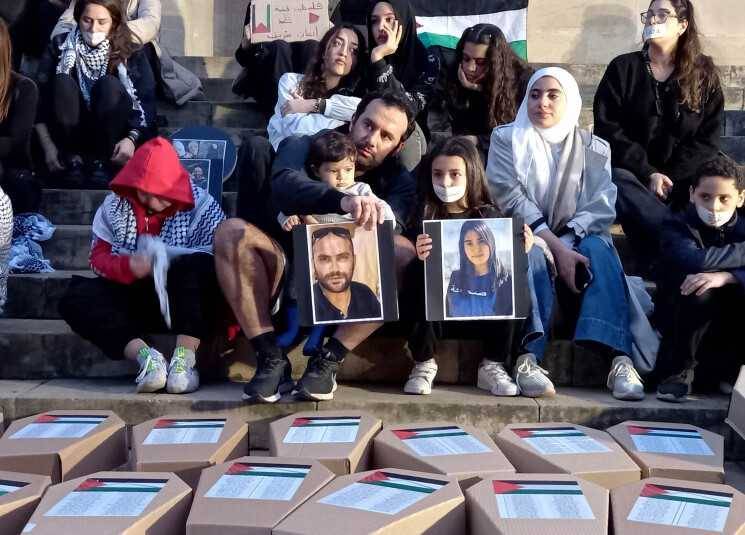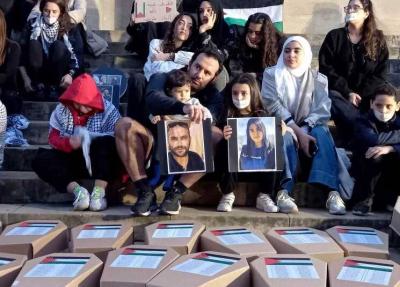According to Israeli media, "Israel is talking about a permanent removal of the Radwan force from northern settlements," as noted by Israeli Defense Minister Yoav Galant, who stated that "there are two ways to push Hezbollah north of the Litani River: either through a political solution or a military one." While the apparent picture highlighted international movements toward Lebanon, notably from the Americans and the French under the public premise of preventing the escalation, the essence is to urge officials in Lebanon to pressure Hezbollah and prevent it from opening a war front against Israel from Lebanon, warning of dire consequences that such a war could bring to the country. However, a responsible source closely linked to the envoys to Lebanon confirmed to "Al-Jomhouria" that Israel is preemptively discussing a predetermined and inevitable victory before ending its war on Gaza, allowing it to impose its will on Gaza and its agenda for the post-war phase, which includes imposing a political solution to reassure settlers or imposing a new reality through military means. This discourse is merely an attempt to contain settler fears.
Regarding the political solution, the source assumes it is based on a hypothetical agenda for the region after Gaza, noting that the French have explicitly stated that the post-Gaza war phase will witness an international conference to set new arrangements that may include the entire region, including Lebanon. This matter is merely an idea for now. However, what should be noted in this context is that the envoys' visit to Lebanon coincided with a dubious raising of the issue of Resolution 1701, concerning its implementation from the Lebanese side, and regarding the area of operation of UNIFIL as a demilitarized zone free from armed men. More than that, linking this raising to promoting what they termed the urgent need to amend the resolution, which would alter UNIFIL's missions and turn them into combat forces, without taking into account that such a matter could plunge the region into uncertainty.
The responsible source affirms that "the raising of the issue of Resolution 1701 is merely a media and political maneuver and is, therefore, not on the agenda for discussion. Furthermore, the UN Special Coordinator Joanna Frontex explicitly denied any intention to amend the resolution, instead confirming the need to implement it. We share her call for its implementation and obliging Israel to comply, and no international envoy has brought this subject before any Lebanese official, neither closely nor distantly." Regarding the military solution, the same source stated: "Before talking about this military solution, let us see how Israel will exit its war on Gaza, and then we can discuss the matter. But apart from that, the military solution alluded to by the Minister of Defense of the enemy means war with Hezbollah and all resistance forces in Lebanon, which is no secret that Israel is calling for. However, this war, as acknowledged by the Israelis themselves, is not guaranteed in its results. Most importantly, what I recently read in Israeli press states that a war with Lebanon would lead everyone in Israel into shelters, and its effects cannot be estimated, especially since today's reality is different from that which existed during the July 2006 war."
In this atmosphere, diplomatic sources revealed to "Al-Jomhouria" that "the United States exerted serious pressures to prevent the war from expanding toward Lebanon. Israel has succumbed to these pressures, but Washington remains concerned that Hezbollah might exploit this situation to launch a war and escalate against the Israeli army, which could enhance the likelihood of widespread confrontations that would directly affect Lebanon." The sources explained that "the cause for this concern is the escalation of military operations along the border, as official levels in Lebanon confirmed that they are not inclined to engage in a war whose consequences and repercussions they cannot bear. However, Hezbollah, which was included in the meetings of the envoys in Lebanon—particularly the French who warned of the dangers of this escalation and the possibilities of a large-scale war—did not provide the envoys with anything that could alleviate this concern."
**Domestic Situation**
Domestically, the political situation remains at a standstill concerning the file of military leadership and the delay in the retirement of Army Commander Joseph Aoun. While the chance to resolve this matter in the caretaker government appears slim due to time constraints, attention is now shifting to parliament, where this file will take its course to the General Assembly. The parliament will convene for a legislative session to be scheduled in a meeting of the Parliament Bureau on Monday afternoon, with expectations that it will take place in the middle of next week and for more than one day due to its extensive agenda.
Despite supporters of extending the Army Commander's term insisting that the extension will be approved in the legislative session, especially since the legal quorum for holding the session is met, as well as the majority vote for extension, political sources confirmed to "Al-Jomhouria" that "it is too early to settle this matter in advance, especially since positions and orientations have not yet been finalized. Therefore, we should not rule out the possibility of surprises in the session." Supporters of the extension, according to "Al-Jomhouria" information, believe that "any challenge to the law extending the Army Commander's term is preemptively dismissed, as it falls under the category of extreme necessities that prevent the military institution from falling into chaos and a vacuum amidst the highly delicate and dangerous circumstances Lebanon is undergoing, especially with the absence of a president, along with the regional conditions that threaten major risks."
On the other hand, opponents of the extension, led by the Free Patriotic Movement, assert that "this procedure lacks legality, and thus it will be defeated by a challenge before the Constitutional Council. The principle is a peaceful transfer of power, and consequently, the assertion that the continuity and cohesion of the institution is tied to a specific person has very negative implications on the military institution, undermining the status of senior officers in the army, who are all qualified to lead the army and maintain it with full competence and responsibility."
**French Delegation**
Diplomatic sources told "Al-Jomhouria" that the delegation coming from Tel Aviv did not convey any threats from the Israeli entity but spoke in diplomatic terms about the necessity of applying Resolution 1701 from both the Lebanese and Israeli sides and calming the southern front as was done in Israel. It discussed some operational and logistical measures necessary to achieve calm in the southern front of Lebanon and northern occupied Palestine; therefore, the delegation included officers from the army and intelligence.
The sources clarified that France's mission is not to convey threats from Israel to Lebanon, as is often claimed, but rather political messages within the path of de-escalation that Paris is pursuing to prevent the war from expanding from Gaza to Lebanon, given the risks of its expansion on all parties, especially on Lebanon.




